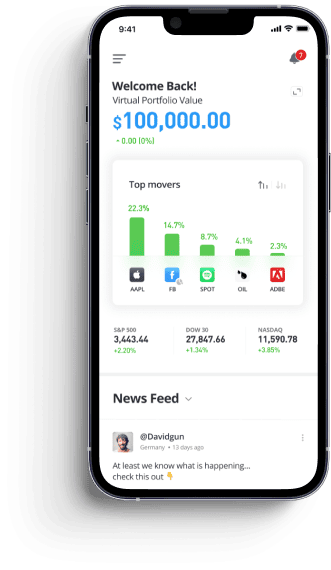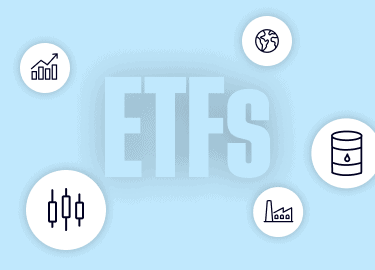Why ETFs?
An ETF, or exchange-traded fund, is a type of investment fund that aims to track the performance of a specific stock market index, industry sector, or asset.

Through one ETF, you can potentially gain exposure to hundreds of assets

ETFs are ready-made and don’t require you to choose assets individually

ETFs can be more cost-effective than actively-managed funds
Choose the right ETF for you
Find the right ETF to fit your goals, risk tolerance, and more.

Track performance of a benchmark index

Hold stocks with a strong history of paying dividends

Can be an excellent lower risk investment option

Offer exposure to the price changes of raw materials
How to buy ETFs on eToro

Select the ETF that you wish to trade, then click the Invest button

Enter the amount of money (or number of units) you wish to purchase

Once you have set the position’s parameters, click Open Trade
Get the confidence to invest in ETFs
Want to hone your investing skills at your own pace, with zero risk? Use the free virtual portfolio with $100,000 in imaginary funds to practice investing in ETFs, as well as everything else eToro has to offer.

- What is an ETF?
-
An ETF, or exchange-traded fund, is a type of investment fund that aims to track the performance of a specific stock market index, industry sector, or asset.
- Are ETFs suitable for beginners?
-
ETFs provide a simple and direct way to get exposure to a broad spectrum of financial assets, spanning commodities, bonds, stocks, and even real estate. ETF investing can be preferable to the use of mutual funds, as they don’t incur the same fees and expense ratios, while allowing investors to open and close positions multiple times a day like stock trading.
If you want to learn more about investing in ETFs, click here to read our full guide on ETF investing for beginners.
- What fees will I pay for trading ETFs?
-
There are two types of fees associated with ETFs. These are:
– Trading commissions: these are the fees that brokers and investment platforms charge to place a trade. On eToro, there are zero commissions* to open and close ETF positions.
– Ongoing charges: these fees, which are sometimes referred to as the “total expense ratio,” are charged by the fund company/ETF provider, i.e. iShares or ProShares. Ongoing charges are generally very low. For example, ongoing charges on the SPDR S&P 500 ETF (SPY) are around 0.095% per year.
- Do ETFs pay dividends?
-
Dividends are cash payments that some companies pay to their investors out of their profits. Not all companies pay dividends, but many well-established companies do. If you hold an ETF that invests in dividend-paying companies, you will receive dividends on a regular basis.
- Are ETFs suitable for long-term investors?
-
Like most investments, adopting a long-term strategy with ETFs can be a good idea, and can help reduce your risk. For example, stock index ETFs can be highly volatile in the short-term. However, in the long run, the stock market tends to rise. So, generally speaking, the longer you invest, the less chance you have of losing money.
- Are ETFs traded 24 hours a day?
-
ETFs are traded in the markets during regular hours, just like stocks. You can continue investing in ETFs throughout the day and in the after-hours market, but the order will be executed at market open.
- What’s the difference between ETFs and mutual funds?
-
ETFs and mutual funds both represent clusters, or “baskets,” of individual bonds or stocks. But there are some key differences.
Mutual funds are typically actively managed, while ETFs are a more passive investment vehicle, tracking an existing market index autonomously. With mutual funds requiring active management, mutual fund investors will pay management fees and often require much bigger levels of an initial investment than an ETF.
ETFs also offer more hands-on control over the price you buy and sell than a mutual fund. You can buy and sell ETFs at fluctuating prices throughout a trading session. However, those who buy into a mutual fund will pay the same price as anyone else that’s invested that day. With mutual funds, the values are not calculated until the end of each trading day.


